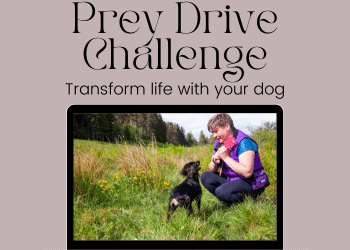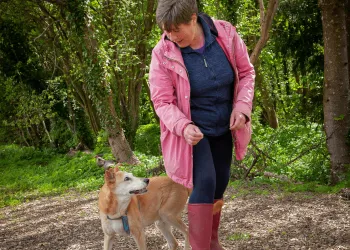
Join 2000+ owners already seeing the difference.
He is so much more engaged with me on the walks and regularly checking in.

He is so much more engaged with me on the walks and regularly checking in.
Join 2000+ owners already seeing the difference.
6 short video lessons (sent by email)
Downloadable worksheets
Bonus Q&A recordings from real owners like you
This is Bria. Bria was like a coiled spring and when off the lead, she would immediately take off to the furthest part of a field – and then wouldn’t come back.
But now? Watch how the recalls from hunting and runs speedily back to her human.
How about Amber? Here's what her owner said after getting started with this challenge:
Amber watched a rabbit run, tracked its scent—then recalled perfectly, all off lead. That wouldn’t have happened before the prey drive challenge.
Learn how to make your daily walks less stressful by setting things up for success - from leads to locations to routines.
Develop your ability to spot the signs before your dog reacts. Get ahead of the chaos, instead of always reacting to it.
Help your dog learn to pause, think, and respond - even when something exciting kicks off.
Find out what your dog finds motivating - and use it to redirect them away from wildlife in a way that actually works.
Get practical help fixing a recall that breaks down around distractions. Make your dog want to come back.
Train your own thinking. Build resilience, stay motivated, and stop letting one bad walk ruin your week.
All lessons come with a short video, worksheet, and optional Q&A recording to help you apply what you’ve learned.
Emma
"Amber and I had the most wonderful walk this morning thanks to what we have learnt and we are only just getting started since finding you via your prey drive challenge. Amber (a Romanian rescue street dog we have had for just over 2yrs) has been working on eye contact and engaging at the start of walks, (making eye contact is major difficult for her, but today was amazing) and I have been working on observations taking into account all the variables – environment, weather, her body language etc. Today she even found a rabbit in the long grass, watched it run away, turned to follow its residual scent, then tracked where it had run but listened to me when I asked her not to follow the scent across the horses field, which she knows she shouldn’t go in. Then did an amazing recall back to me – ALL OFF LEAD. (She hadn’t been off lead before your prey drive challenge). (But we are only on our own land, which is pretty secure and she knows the boundaries too now, so still have management in place)"
Heidi
"I was able to call Cheza off deer (twice!!!!). The first time she ran about 50m and stopped. She looked back and me, paused, looked at the deer, then came to me. I lost it with joy, and I rewarded her with throwing a handful of high value treats into the snow, so she could spend a few minutes hunting with her nose to her content. She was absolutely delighted, wagging and wagging with her head buried in the snow. The gift Tracey has given us through her training challenge makes tapping into Cheza's prey drive a fun adventure in curiosity. I no longer feel frustrated. Instead, my husband and I are on a quest to fulfill her olfactory-loving spirit, and we all win!"
Anonymous
"Tracey you have a lovely and supportive way of teaching and sharing information and observations."
6 short video lessons (sent by email)
Downloadable worksheets
Bonus Q&A recordings with real owners like you
A: Yes. Completely free. No credit card, no catch.
A: If your dog chases wildlife, gets over-aroused on walks, or makes you feel like an anchor holding them back instead of a partner - this is for you.
A: You’ll get 2–3 emails per week for the first two weeks, then a few more in the final week so you can finish strong. Each one is short, practical, and built to help you make progress. Most people look forward to them - and often email me if one goes missing!
A: No problem. You can revisit any email at any time. Take it at your own pace.
A: You’ll get the chance to join my High Prey Drive Club for more support, or explore affordable masterclasses and bite-sized trainings if that suits you better. No pressure.

If you want to feel more confident, less overwhelmed, and actually enjoy your walks again...
For over 20 years, I’ve lived with and trained high prey drive dogs of various breeds. I love the process of turning challenges into opportunities for connection and joy. I know firsthand how overwhelming it can feel, but I’m here to show you that it doesn’t have to be.
My passion is creating simple, effective methods that make life with high prey drive dogs not just manageable — but joyful. Since 2018, I’ve helped hundreds of dog owners just like you transform their lives with their dogs, breaking free from frustration and finding confidence in their training.
Here’s what sets me apart:
Expertise Backed by Science: I hold a master’s degree in Applied Animal Behaviour and Training (with distinction!) and a BSc (Hons) in Canine Behaviour and Training. I’ve even earned an MA (Hons) in Philosophy, giving me a deep understanding of ethics in dog training.
A Leader in the Field: Modern dog training must align with science—but I don’t stop there. I actively contribute to the scientific understanding of prey drive in dogs through published research in Applied Animal Behaviour Science. I’m also a peer reviewer for the journal, ensuring the latest studies help improve lives like yours.
Real Experience, Real Results: My tried-and-true methods have been developed through decades of success with my own dogs and my clients’ dogs. You’ll benefit from the same proven techniques that have helped so many others.
You and your dog deserve a life of harmony and joy. The High Prey Drive Club is the culmination of my knowledge and experience, designed to give you everything you need to succeed. Let’s start this journey together — I’m here to support you every step of the way.

Legal Disclaimer: I would love to promise you the same results as I got from this training. I would also love to promise you how long it will take. I simply can't give any guarantees. Success in dog training depends on a range of factors including but not limited to: your own efforts, your skill at implementing the training suggested, the time you spend on training, as well as your dog's prior experiences, health, and temperament. You remain responsible for your dog's behaviour.